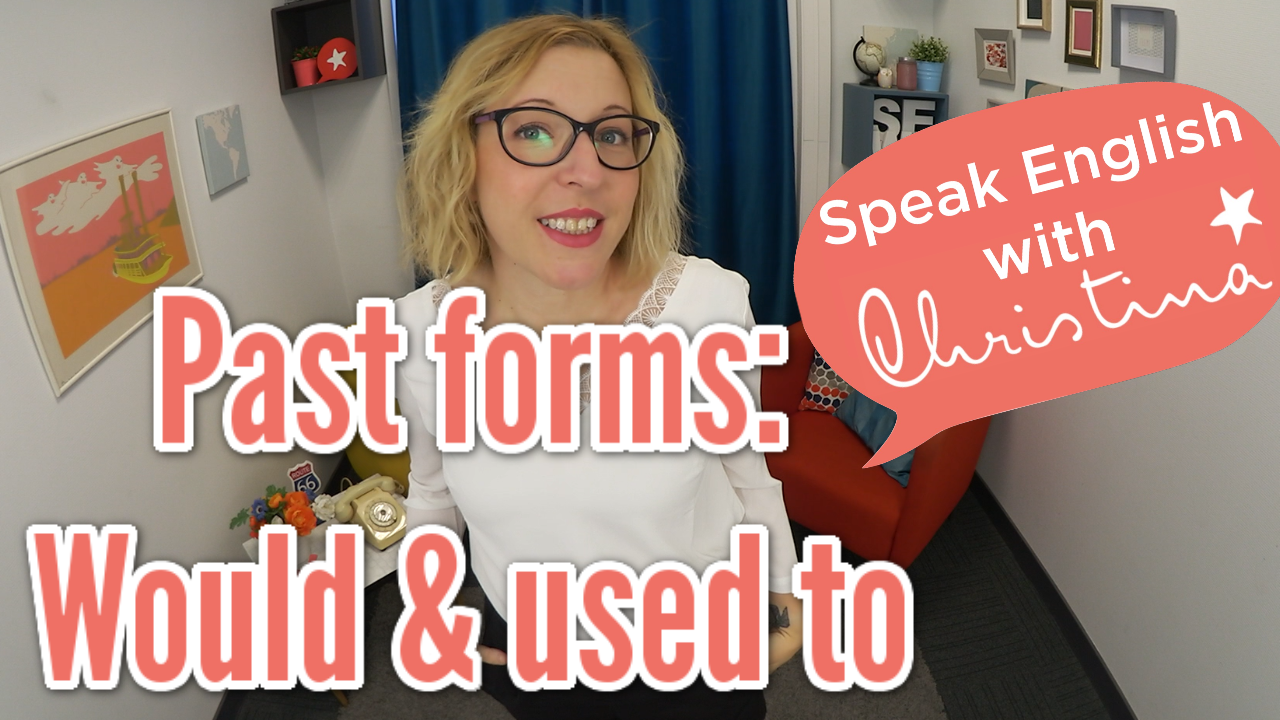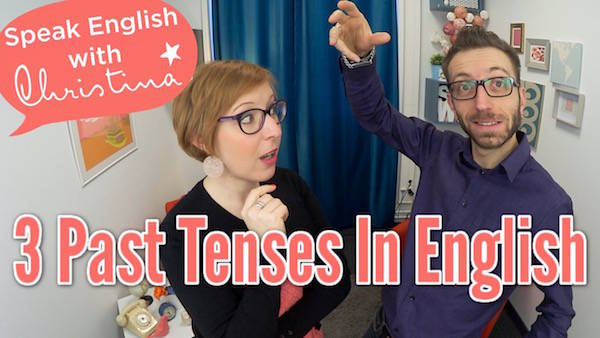
Hi there! I’m your English coach Christina, welcome to Speak English with Christina, where you’ll learn about American culture and business know-how to become confident in English.
In American English, there are a few different ways we can talk about things we did in the past that don’t happen anymore. You may already be familiar with the past simple.
For example, if the action happened just once, you can say, “I went to the library yesterday.” Or, “I visited the company headquarters last week.”
But how can you express repeated actions in the past that you did again and again?
It’s quite simple, and it’s our topic for this episode. Let’s go!
Practice speaking English, to use what you learn in each episode
It’s great that you learn by watching my episodes. And you’ll learn even faster by practicing what you learn in real conversations in English.
In my Faster Fluency Conversation Club, motivated students meet four times a week with one of my expert English fluency trainers to practice in small groups, with motivated members of the Speak English Community.
Each class is focused on a theme. Prior to the class, you’ll receive vocabulary and grammar that has to do with the theme so you can practice using new vocabulary and grammar structures in real conversations.
You even get episodes of our Fluency Club Podcast, to understand native speakers who speak fast!
The Faster Fluency Conversation Club is a fantastic way to gain fluency faster, while having a lot of fun! Do you want to join us? Click here for all the details!
When I was young, I would…
Let me tell you a story about me and my sister Lisa. If you’re a student in the Understand Real American English online course, you met her in Module 1.
Well, when we were kids, we would fight all the time. We would run around the house, we would pull each other’s hair, and we would call each other stupid names. It drove my mom and dad crazy!
Even when we went to the same school years later, we would make fun of each other all the time. But now, we’re more mature, and we actually like each other! I guess that’s just how siblings are! That’s a true story!
Did you notice a key word in my story?
The word is “would.” One of the most common ways to talk about something you did repeatedly in the past is to use the past tense of “Would”, in addition to the other past tenses in English that you may already know!
Would for past actions
We often use “would” when we’re describing our childhood.
For example:
- “When I was young, I would draw every afternoon.”
- “When I was young, I would ride my bike everywhere.”
Of course you can use “would” for other repeated actions that happened at any age. We can use “would” for repeated actions that happened more recently.
For example:
- “On our vacation last year, we would go for long swims in the lake.”
- “Before picking up my child from school, I would drink a coffee at the cafe.”
- “When I first started my job, I would write the day’s goals down before work every day.”
- “When I was a sales rep, I would make sure I always listened carefully to what my customers wanted.”
- “Before I used English every day in my work, I would always have trouble spelling the English vowels.”
Do you see how in each example, the word “would” is used to describe a repeated action or habit that happened in the past? What if you want to talk about a paste state or situation?
“Used to” for past situations & recurring habits
We use “used to” when describing past states or situations.
For example
- “I used to be a lawyer.”
- “I used to have difficulties understanding Americans when they talk fast.”
This describes a past situation that lasted for a period of time. If I said “would” instead of “used to” in this scenario, it’s incorrect. “Before I became a judge, I would be a lawyer.” No, that just doesn’t make sense!
So we use “used to” to talk about past situations that are no longer true today, often jobs we did in the past, or places where we lived in the past.
For example:
- “I used to work in a school”
- “I used to live in the US.”
- “I used to be confused about how to tip in the USA. But now I understand!”
Here are some other examples of “used to”, to describe past situations that lasted for a period of time, but are no longer true today:
- “I used to work in the mail department, but I was promoted.”
- “Our company headquarters used to be in the United States, but they moved to Canada.”
- “I used to have trouble understanding American English.” (You’ll be able to say that one after you take one of my courses 😉
You can also use “used to” to describe a repeated action or recurrent habit in the past, similar to “would”.
Some examples:
- “I used to ride my bike to work, but then I got an apartment right near the office.” / “I would ride my bike to work every day, so I was really in shape then!”
- “We used to have meetings every Tuesday morning, but we stopped that.” / “We would have meetings every Monday morning at 7am. It was awful!”
- “I used to feel nervous before introducing myself in English, but I practiced and now it’s ok.” / I would feel nervous before introducing myself in English, but then I practiced, and got more confident.”
Want to hear all of these examples, and learn even better? Watch the episode below:
Now what about you?
Do you have any stories you’d like to share about your past experiences, habits, and cities you’ve lived in?
Did your siblings ever pull your hair like my sister and I did? Hopefully not, but you never know!
Share your past habits, experiences, and places you’ve lived in the comments, using “would” or “used to”!
Practice speaking English, and get more vocabulary too!
And if you want to practice SPEAKING English, so you feel confident before you actually meet someone in English?
Then consider my Faster Fluency Conversation Club. Club members can participate in 4 group sessions per week.
You get plenty of practice to speak English and receive feedback on mistakes or suggest ways you can speak more colloquially, so you gain fluency faster.
You can get all the details and join the Fluency Club by clicking on this link.
You’ll also get extra resources and a conversation guidebook, to help you increase your vocabulary and become more confident in conversations.
Thank you for learning with Speak English with Christina, and I’ll see you next time!
More good stuff...
Click the image to learn more









I want to stay english
Do you mean “I want to learn English?”
Have a great day Christina! I have many difficulties in terms of speaking english fluently i want to learn more about ur lessons and of course i would like to be in a circle of people where i could express myself and be corrected if i make mistakes.Thank You
Hi Shiera, To express yourself more and join a circle of learners, I can suggest a program that will help you with that!
The program is Speak English Confidently, which gives you the close guidance of a private teacher to correct your mistakes and help you speak more correct English. The program also includes membership in my Faster Fluency Conversation Club, to help you feel more confident speaking, get more vocabulary on different everyday and professional topics, and also help you communicate better in English in an international context.
Are you on my email list? I’m going to share information about this new program to subscribers next month! If you’re not already on my email list, please join, so you get the information!
Have a great day Christina!I like ur lessons very much,it is easy to understand by some people whose English is not their first language.I love it! And i would like to be one of ur students someday.To be in a circle of people,making activities together,sharing thoughts w/them and be fluent enough in terms of speaking english is what i really want to overcome.Thank You Christina
Thanks so much for your kind words, Shiera, and congratulations on being able to understand me easily! I would love to have you as one of our students one day! You’re right, the community of learners, working together towards the same goal of improving English, getting support from our teachers and coaches… Past students have really gotten a lot from their investments with us! I’m sure you will too, when you’re ready to join us!
I want a course complete learning English as free thanks so much I never forget you my name Reza Parsa My email. Rezabimetamin@gmail.com
Hi Reza, We have lots of free resources on the blog, please feel free to use all of them to learn English! Thanks and enjoy!